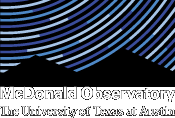Joint project with Texas Forest Service makes McDonald Observatory safer, brings national recognition
25 July 2005
(Texas Forest Service press release)
FORT DAVIS, Texas — When dry lightning sparked several wildfires in the Davis Mountains July 1, staff at the University of Texas McDonald Observatory knew, once again, the famous observatory may be threatened by more than smoke. One of the fires, the Three-Points Fire, which burned nearly 8,000-acres, came dangerously close to the observatory. But the staff also knew they had worked diligently with the Texas Forest Service for the past three years to reduce the threat of wildfires destroying not only the valuable telescopes and research equipment, but also the community that surrounds it.
“We encouraged the observatory managers to take a proactive approach, before the observatory was threatened by wildfire, like those occurring in the Davis Mountains in 2000 and 2001,” Texas Forest Service Regional Fire Coordinator Bill Davis said. “In just that one section of land, there are more than $200 million in assets and more than 150 residents. We knew that for not a lot of money, they could add a whole lot of protection.”
Their work has paid off in more than peace of mind. On Saturday, July 30, the McDonald Observatory will receive national recognition as a Firewise Community/USA for their efforts in making the observatory and surrounding community more resistant to wildfires.
McDonald Observatory Superintendent K. Russell Peterman is a firm believer that the project was well worth the time and work committed to it. He said the main focus was reducing fuels-that is high grass, brush and trees-by thinning out trees, cutting low-hanging branches, mowing grass and removing brush, which will be an ongoing effort. Crews also put in firebreaks to stop the spread of an approaching fire.
The Texas Forest Service also constructed a fire escape road because there was only one exit/entrance from the Observatory. “We literally would have had no way off the mountain if a fire would have blocked the main road,” Peterman said. “That problem has now been solved.”
With its tours and stargazing events, McDonald Observatory is also a well-known tourist destination. On any given day, there could be thousands of people visiting the observatory. “This project makes complete sense from a public safety standpoint,” Peterman said.
The observatory is home to the third-largest optical telescope in the world, the Hobby-Eberly Telescope (HET). “Since HET will be used for a major dark energy experiment that will require more than $20 million in new science instruments, it is more important than ever to protect the huge investment that The University of Texas has in this facility,” he added.
Other observatories have also felt the effect of wildfires. In 2003, the Mount Stromlo Observatory in Australia lost five telescopes, workshops, eight staff homes and the observatory's main dome to a wildfire. Just this month, Arizona's Fred Lawrence Whipple Observatory was evacuated due to the imminent threat from a 22,500-acre fire. “Stromlo really brought home the fact that we could lose our whole facility in a fire,” Peterman said.
The project has also led to a grant for new equipment for McDonald Observatory Volunteer Fire Department, which received a new brush truck, funded through the Texas Forest Service's Rural Volunteer Fire Department Assistance Program. The University of Texas has also approved funding for two paid safety and security positions at the observatory, which are currently being advertised.
“With the assistance of the Texas Forest Service and the State Firemen's and Fire Marshals' Association, we've achieved this Firewise status,” Peterman said. “They've come together with us to make this a safer community.”
— END —





